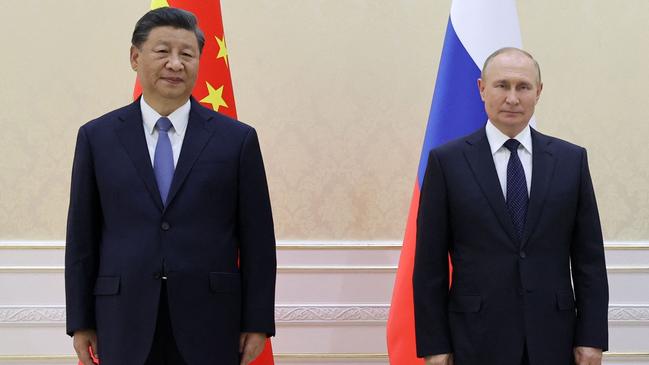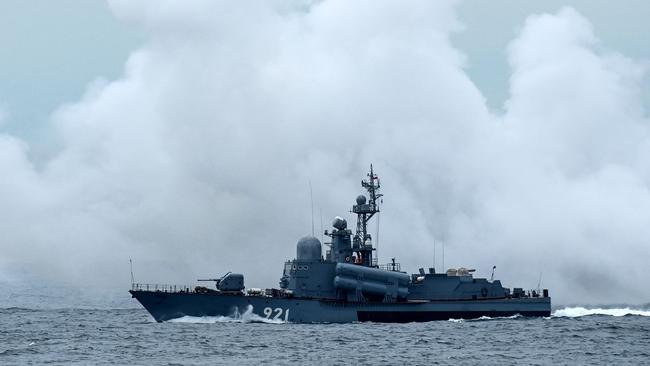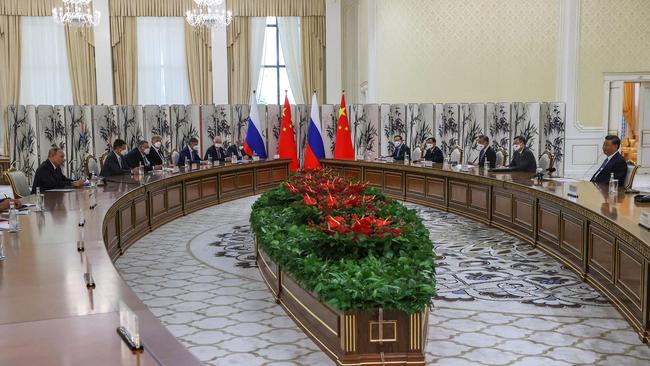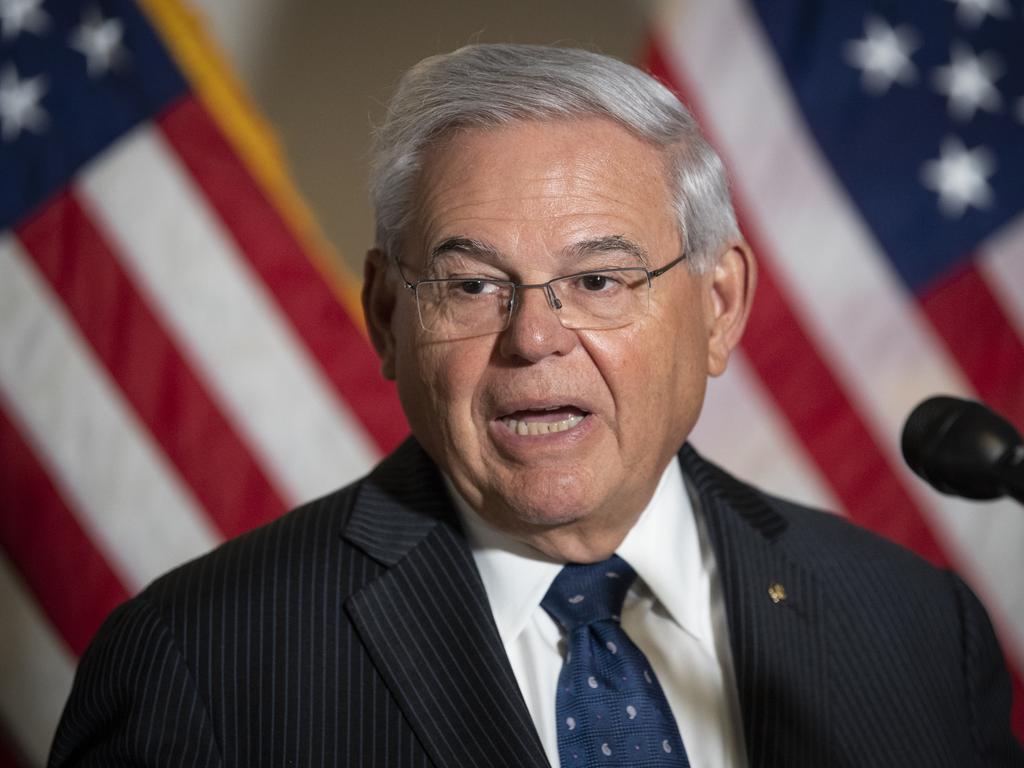Russia, China hold drills in Pacific as Xi Jinping vows ‘calm to troubled world’
Xi Jinping tells Vladimir Putin they can work together as ‘great powers’ for world stability amid their second Pacific military drill.

Russia and China are conducting joint military drills in the Pacific, even as Xi Jinping told Vladimir Putin the two countries should work together as “great powers” to bring stability to a world rocked by turmoil.
Warships of the Russian Navy and the Chinese People’s Liberation Army Navy were scheduled to drill in tactical maneuvering, signals communication, artillery fire and shipboard helicopter operations as part of an “international military cooperation” program, according to a report by Tass, Russia’s state news agency.
The drills are only the second joint exercises in the Pacific in recent history; the first were carried out in October 2021.
“The tasks of the patrol mission are to strengthen naval cooperation between Russia and China, maintain peace and stability in the Asia-Pacific region, monitor coastal waters and protect Russian and Chinese maritime economic sites,” Russia’s Defence Ministry said in a statement.

‘We can bring calm to the world’
Meeting in Uzbekistan for their first in-person talks since they unveiled their “no limits” strategic pact just days before Russia attacked Ukraine, Mr Putin thanked the Chinese President for taking a “balanced position” on the invasion.
“China is willing to make efforts with Russia to assume the role of great powers, and play a guiding role to inject stability and positive energy into a world rocked by social turmoil,” Mr Xi said.
The meeting was Mr Xi’s most significant since ending his almost 1000 days behind China’s strict “Covid zero” borders.
The Russian President gave no indication he was willing to back down following global condemnation of Russia’s invasion, and was quick to take aim at the US and its allies, and offer support for China’s aggression towards Taiwan.
“Attempts to create a unipolar world have recently acquired an absolutely ugly form and are completely unacceptable,” he said. “We adhere to the principle of one China. We condemn the provocation of the US and their satellites in the Taiwan Strait.”
Their meeting took place on Thursday night in the Uzbek city of Samarkand, on the sidelines of the Shanghai Co-operation Organisation’s leaders’ summit, a China-created regional political, economic and security grouping. Mr Xi and Mr Putin’s closed-door discussion marked a fresh development in their joint effort to push back against the US-led international order.

Russia’s war has threatened to overshadow the leaders’ meeting of the grouping, which Beijing portrays as an alternative to the US-led international order.
Raffaello Pantucci, an expert on China in central Asia and author of Sinostan, said while many of the leaders at the summit were uncomfortable with Mr Putin’s war-making, none wanted to speak about it directly. “Who in this group wants to openly condemn Russia?” Mr Pantucci said.
Beijing wants to use the gathering to brandish the accomplishments of Mr Xi’s first decade in power, weeks before he is given an unprecedented third five-year term as China’s leader.
A huge welcome party greeted Mr Xi’s Air China jet at the VIP quarters of Samarkand’s airport, led by Uzbekistan’s President Shavkat Mirziyoyev. Uzbek trumpeters welcomed the Chinese leader as a young troupe in national dress sang and danced.
“I look forward to attending the Samarkand Summit of the Shanghai Co-operation Organisation and working with all parties to carry forward the Shanghai Spirit,” Mr Xi said in a short address at the airport. Hours earlier in neighbouring Kazakhstan, Mr Xi was awarded the Order of the Golden Eagle, the central Asian country’s highest honour.
“Xi is truly a great leader who has won the wholehearted support of the Chinese people,” said Kazakhstan’s President Kassym-Jomart Tokayev.
Mr Tokayev said Mr Xi had made “outstanding contributions to promoting a new type of international relations”, citing both his Global Development Initiative and the Global Security Initiative.
“They know now is the moment to butter him up,” said Mr Pantucci, a senior fellow at the S. Rajaratnam School of International Studies in Singapore.
The attendance at the SCO summit of some of the world’s most important leaders, including Indian Prime Minister Narendra Modi, is a coup for Beijing as it spruiks its international leadership credentials.
The leaders’ meeting, which will run to Friday, will consider Iran’s application to join the group, which includes China, Russia, India, Pakistan, Kazakhstan, Kyrgyzstan, Tajikistan and Uzbekistan. How to deal with the profound security complications of the full retreat of US-led forces from Afghanistan and its restored Taliban government will be on the group’s crowded agenda.
Evan Feigenbaum, a central Asian expert who worked in the US State Department during the Bush era, said Mr Xi faced a dilemma at the gathering as he attempted to straddle a host of competing positions. “(Xi) will want to back up Moscow generally and Putin personally,” said Dr Feigenbaum, a vice-president at the Carnegie Endowment for International Peace.
“If he leans too hard into that, he will drive a wedge with the other neighbours, whom Beijing wishes to cultivate, and split the SCO in the process,” he said.
Pan Guang, the director of the Shanghai Co-operation Organisation Studies Centre, said it was inconceivable that many of the group’s former Soviet members would join a statement supporting Russia’s war on Ukraine.






To join the conversation, please log in. Don't have an account? Register
Join the conversation, you are commenting as Logout